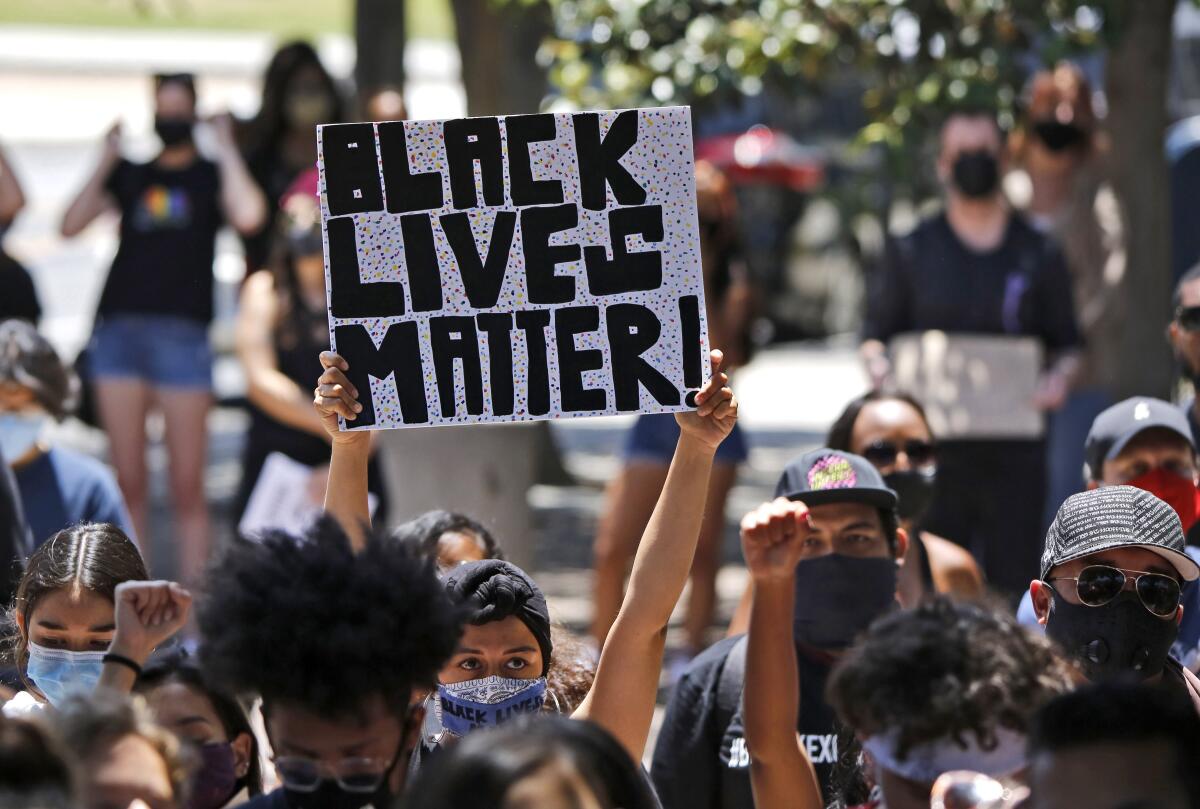Opinion newsletter: Still fighting for emancipation in 2020

- Share via
Good morning. I’m Paul Thornton, and it is Saturday, June 20, 2020. I humbly advise you to avoid traveling to Tulsa, Okla., today. Let’s take a look back at the week in Opinion.
Of course, things could be a lot worse for Tulsa. President Trump could have held his first campaign rally since early March on June 19 as first planned, committing the indecency twofer of packing an arena during a pandemic and holding a rally on Juneteenth in a city where an entire Black neighborhood was razed by racist mobs in 1921. If one good thing is to come out of this fracas, it’s the renewed national focus on the day celebrating the emancipation of enslaved people after the Civil War.
Or, as Tamara Winfrey-Harris put it in her L.A. Times op-ed piece, at least the illusion of Black emancipation is celebrated. Before expressing some guarded hope that perhaps this time the calls and marches for equality will get results, Winfrey-Harris offered this cold assessment of the situation since Abraham Lincoln’s presidency:
“Since 1865, Black people have been gaslighted. America has gripped our chains and, in a cruel sleight of hand, pretended its fists were empty. Black freedom is, in the words of Harlem Renaissance writer Ralph Ellison, a ‘gaudy illusion.’ Juneteenth is more illustrative of the enduring hope of an oppressed people than an observance of Black emancipation.
“My father recalls of Black life in the Jim Crow South, ‘We didn’t give a lot of thought to the fact that we were not free; we just knew that we were not.’ African Americans still know this. So we scream, march, demand and hope.”
I wish I could say our Opinion coverage this week offered more reasons to hope. More accurately, it makes clear the amount of work that still must be done — police reforms, crime investigations and so much more — for any optimism to be justified.
A cure for the common opinion
Get thought-provoking perspectives with our weekly newsletter.
You may occasionally receive promotional content from the Los Angeles Times.
Two men were found hanging from trees in Southern California, not years and years ago but this week, amid protests for police accountability and racial justice. It didn’t help that authorities in Palmdale and Victorville — the cities where, respectively, Robert Fuller and Malcolm Harsch died — quickly said there was no evidence for “foul play” (a euphemism that one letter writer did not appreciate) before conducting thorough investigations. “We do not — we must not — simply shrug and say ‘suicide’ when Black men are found hanging in trees,” says the L.A. Times Editorial Board. “We leave no stone unturned until we can determine conclusively that these men were not killed by others, but by themselves.” L.A. Times
This is an easy call: We should not name U.S. military installations for traitors. That ought to go without saying, but in some quarters in this country — including, sadly, at the White House — it’s perfectly OK for so many Army forts to bear the names of Confederates who took up arms against their own country in defense of slavery. In a Times op-ed article, Andrew Bacevich and Danny Sjursen offer up 10 warriors more worthy of having Army bases re-named in their honor, including Daniel Inouye, George McGovern, Geronimo and Josephine Nesbit. L.A. Times
These racist brands are meant to make their food more appealing to white people: Aunt Jemima and Uncle Ben, two mainstays of American pantries, are being retired. Katherine Hu, a summer intern for the editorial page, names other brands that sanitize culture for white tastes. Art historian Richard J. Powell writes that Aunt Jemima will live on in subversive works of art: “For many, this malignant stereotype created an opportunity for a parody, or better yet, for radical conversion of the Jemima image into an image of power, in a way that redeemed centuries of disparagement, belittlement and betrayal.”
Enjoying this newsletter? Consider subscribing to the Los Angeles Times
Your support helps us deliver the news that matters most. Become a subscriber.
From the world of “if only,” beginning with Mike Pence: The vice president would almost certainly make a better commander in chief than Donald Trump (but then again, so would I, and I can assure that is saying almost nothing). But what if the Senate had taken its chance to remove Trump during the impeachment trial? It’s a thought experiment conducted this week by columnist Jonah Goldberg. Related to that is John Bolton: What if he had testified during the impeachment trial? Senior editorial writer Michael McGough doesn’t think it would have turned out any differently.
L.A. is broken. The “People’s Budget” would finally do something to fix it. Since 2013, Los Angeles’ Black Lives Matter group has been doing the work that led us to this moment. It organized. It called for a police chief to be fired. It showed up to hearings. And yet it failed to garner significant support from the City Council. Now, with the twin crises of anti-Black policing and COVID-19 demonstrating just how broken Los Angeles has been for many years, more people are looking to the People’s Budget for a way forward. “BLM-LA organizers have repeatedly modeled what it would look like for Angelenos to live the progressive values we purport to hold,” writes Melissa Batchelor Warnke. “It’s time for our mayor and council members to do the same.” L.A. Times
Stay in touch.
If you’ve made it this far, you’re the kind of reader who’d benefit from subscribing to our other newsletters and to The Times.
As always, you can share your feedback by emailing me at paul.thornton@latimes.com.
A cure for the common opinion
Get thought-provoking perspectives with our weekly newsletter.
You may occasionally receive promotional content from the Los Angeles Times.




